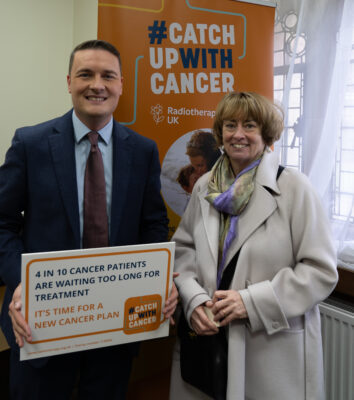 Labour called to urgent action on record ‘legacy’ cancer waiting lists.
Labour called to urgent action on record ‘legacy’ cancer waiting lists.
Professor Pat Price, leading oncologist, co-founder of #CatchUpWithCancer campaign and chair of Radiotherapy UK, responds to latest monthly cancer waiting times.
“Some legacies will be measured in money, but the impact of the legacy of cancer treatment delays will be measured in lost lives.
“Today’s cancer data shows that still a full third of cancer patients are not receiving treatment on time. The Secretary of State is right, the NHS is broken.
“It’s crucial for Wes Streeting and his team to recognise the colossal challenge in cancer care ahead. Reversing the decision to scrap the dedicated cancer plan of the previous government is vital.
“As is ensuring that we improve both cancer diagnosis and cancer treatment capacity, in key areas like radiotherapy. Merely diagnosing patients without boosting treatment capacity will only see newly diagnosed patients added to record waiting lists for treatment.
“The cancer crisis is our most pressing health emergency at present, and these latest waiting time figures should serve as a call to action to drastically rethink our approach.”
This Thursday (July 11th) marks the first release of NHS Cancer Waiting Times since the Labour Government took power, setting the goalposts for the most pressing challenge in healthcare. Bringing down these ‘legacy’ wait times, which Labour has inherited from the previous administration, is a top priority for all stakeholders.
Since April last year, over 100,000 cancer patients in England have missed the 62-day treatment target after an urgent referral. This target is crucial for survival, as a 4-week delay increases the risk of death by 10%.
This target hasn’t been met since 2015.
The urgency is heightened by predictions that 4 million people will have cancer in the UK in the next decade, with up to 234,000 deaths annually. Labour must implement swift measures to save lives and ensure timely, effective NHS treatment.
In a paper released just this week in the international journal the Lancet Oncology, world-leading cancer experts have reiterated their call for a dedicated National Cancer Control Plan. A central part of any National Cancer strategy would be to focus attention and resources on internationally recognized solutions.
Radiotherapy treatment, for instance, is the second-most effective cancer treatment method and is considered an essential part of curative treatment for approximately 40% of cancer patients.
International benchmarks suggest 50% of patients should receive radiotherapy, but only 27% in England do. Despite its cost-effectiveness at £3,000-£4,000 per treatment, radiotherapy has seen insufficient investment.
